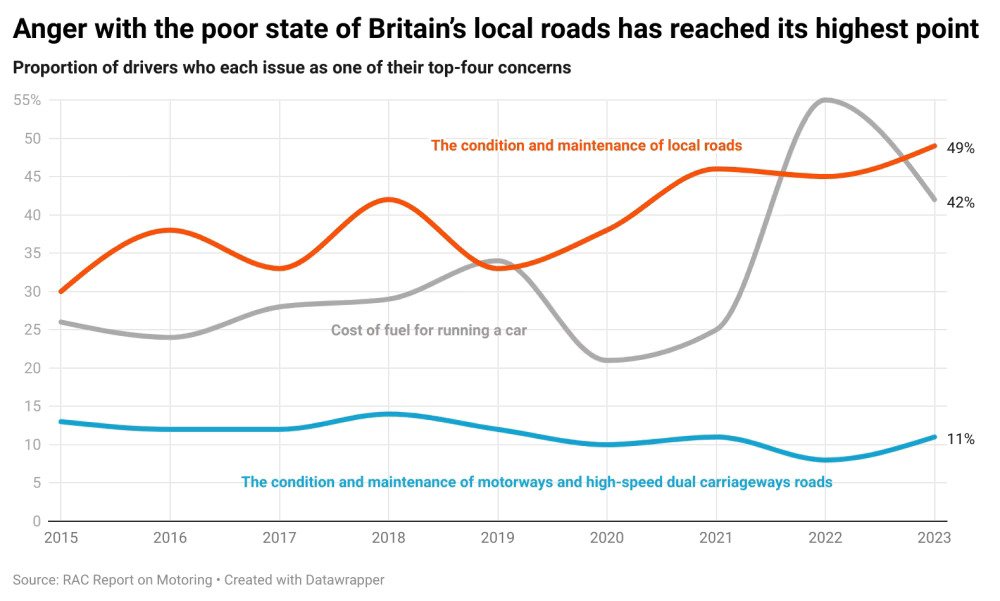Frustration over the poor state of the UK’s local roads has reached its highest level in nine years. In the RAC’s annual Report on Motoring*, 49% of surveyed drivers cited it as a top concern, making it the most significant issue this year by a considerable margin.
Driver concern about the condition and maintenance of local roads has reached a record level since the RAC first began collecting opinions in 2015. The previous high, at 46%, was recorded in 2021. Following local roads, the next major concern was the cost of fuel, mentioned by 42% of drivers.
The condition and maintenance of local roads are notably problematic for older drivers, with 55% of those aged 45 to 64 listing it as their top concern. Among those aged 65 and older, this figure rises to 59%.
The RAC’s study also reveals that 67% of drivers claim that the condition of the local roads they regularly use has worsened over the past 12 months, up from 60% in the 2022 report, marking the most substantial increase since 2017. Only 4% believe that local road conditions have improved over the last year. While the poor state of road surfaces is primarily responsible (as cited by 97% of drivers), several other factors contribute to this decline, including faded road markings (61%), litter (35%), and poor visibility of road signs (34%).
The deteriorating road conditions have forced most drivers to take sudden, sometimes dangerous evasive actions. A third (35%) reported having to swerve quickly to avoid a pothole, sometimes crossing into another lane or the opposite side of the road. Seven in 10 (69%) say they have had to brake sharply to navigate over a pothole, and 37% have tried to maintain a greater distance from the vehicle in front to allow for more time to react to road surface issues.
Drivers have more positive views about the condition of Britain’s motorways and high-speed dual carriageways compared to local roads, but many are still dissatisfied with the deterioration they’ve witnessed. This year, 11% of drivers consider the condition of these major roads as a top concern, up from 8% in the 2022 report. Among those who use motorways and other high-speed roads, 44% claim that their condition has worsened in the past 12 months, a significant increase from 38% in 2022. The worsening road surfaces (cited by 81%) are the primary cause of this decline, but faded lane markings (46%), roadside litter (39%), and poor visibility of road signs (28%) also contribute.
When repairs are carried out on roads of all types, drivers are generally unimpressed with the quality of the work. 81% believe that roads are not resurfaced to a high enough standard, and a similar proportion (81%) think that roads are not resurfaced as frequently as they should be. Roadworks causing disruption are another source of dissatisfaction, with 74% of drivers frustrated by consecutive roadworks on the same road and 72% complaining about works frequently running over schedule.
The 2023 edition of the Asphalt Industry Alliance (AIA)’s annual report indicates that local councils in England and Wales continue to face significant shortfalls in the funding required to maintain road surfaces adequately. The latest Annual Local Authority Road Maintenance (ALARM) report**, published in March 2023, states that the total funding needed to address the backlog in road maintenance has increased to over £14 billion, up 11% from the previous year.
 Simon Williams, the RAC’s head of policy, commented: “Many drivers may wonder why so many potholes have appeared on the country’s local roads, even in the absence of an exceptionally cold winter. Unfortunately, the long-term lack of funding for maintenance and repair work has left our roads in such a fragile state that it takes only a small amount of rainwater seeping into existing flaws, followed by sub-zero temperatures, for them to deteriorate further.
Simon Williams, the RAC’s head of policy, commented: “Many drivers may wonder why so many potholes have appeared on the country’s local roads, even in the absence of an exceptionally cold winter. Unfortunately, the long-term lack of funding for maintenance and repair work has left our roads in such a fragile state that it takes only a small amount of rainwater seeping into existing flaws, followed by sub-zero temperatures, for them to deteriorate further.
“We must put an end to the ongoing deterioration of our local roads by providing councils with the necessary funding to plan comprehensive maintenance programs that include resurfacing roads that have gone beyond the point of patching up.
“This is why we continue to call on the Government to allocate 2p from every litre of existing fuel revenues over a five-year period, providing councils with the funds needed to plan proper maintenance programs.
“We have raised this issue with the Secretary of State for Transport and have urged the Chancellor in our Autumn Statement submission to reform his road funding policy because, as it stands, the £26 billion collected from drivers is currently just another form of general taxation.
“We believe a change in funding strategy is long overdue, especially considering that England’s major roads receive seven times the funding that local roads do, despite there being seven times more miles of minor roads.
“It is simply wrong that drivers who contribute billions in taxes each year have to contend with roads that are far from being fit for purpose.”
* RAC Report on Motoring 2023 – survey completed by a nationally-representative sample of 2,583 UK drivers
** https://www.asphaltuk.org/wp-content/uploads/ALARM-press-release-for-website.pdf



















